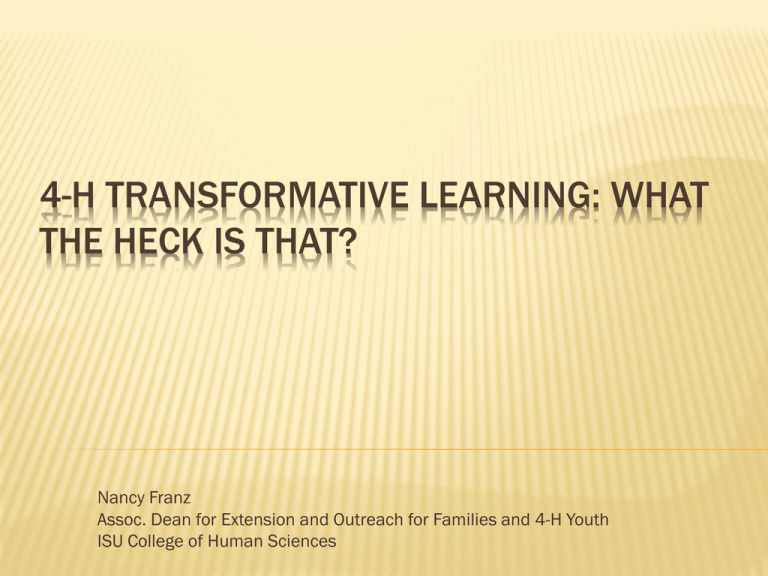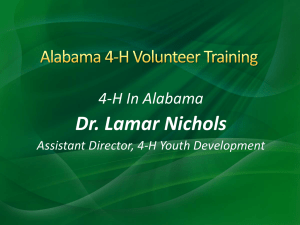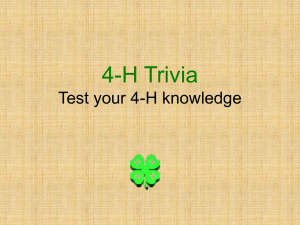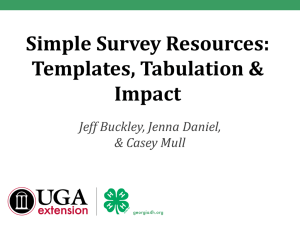Transformative Learning - 4-H Youth Development Program
advertisement

4-H TRANSFORMATIVE LEARNING: WHAT THE HECK IS THAT? Nancy Franz Assoc. Dean for Extension and Outreach for Families and 4-H Youth ISU College of Human Sciences OVERVIEW Introduction Four approaches to 4-H work What is transformative learning Conditions to enhance transformation Implications for 4-H work HOW DID NANCY GET INTO THIS? Midlife crisis – a PhD Cornell focus on adult education Personal experience with 4-H The push for 4-H scholarship A great match of personal interests and organizational need Enjoyable Approaches to 4-H’s Educational Mission CONTENT LOW P R O C E S S HIGH FACILITATION TRANSFORMATIVE EDUCATION SERVICE CONTENT TRANSMISSION HIGH LOW D. M. Ewert, 2001 WHAT IS TRANSFORMATIVE LEARNING? A prominent adult education theory Individuals, groups, and organizations arrive at a new perspective and action that greatly differs from past views and behaviors Deep Pervasive Sustained MEZIROW’S 10 TL STEPS Experiencing a disorienting dilemma Undergoing self-examination Conducting a critical assessment of internalized role assumptions and felling a sense of alienation from traditional social expectations Relating one’s discontent to similar experiences of others or to public issues – recognizing that one’s problem is shared and not just private Exploring options for new ways of acting MEZIROW’S 10 STEPS Building competence and self-confidence in new roles Planning a course of action Acquiring knowledge and skills for implementing one’s plans Making provisional efforts to try new roles and to assess feedback Reintegrating into society on the basis of conditions dictated by the new perspective CONDITIONS OF THE LEARNING ENVIRONMENT TO ENHANCE TL IN 4-H. Strong partner facilitation Critical reflection Critical events Fundamental difference between partners wrapped in similar purpose Independence with interdependence context STRONG PARTNER FACILITATION Actions taken by both partners through a variety of methods (talking, stretching, pushing each other) Supportive social and supervisory relationships Mentoring and support from “the other” CRITICAL REFLECTION Reflective events/moments Facilitated group processes Examining beliefs and assumptions CRITICAL EVENTS Pushed outside a comfort zone (or two) Trigger events Disorienting dilemma/disorientation DIFFERENCE BETWEEN PARTNERS WRAPPED IN SIMILAR PURPOSE Common group goals within a diverse group Common goal Diverse perspectives/way of being INDEPENDENCE WITH INTERDEPENDENCE Practice independence in a safe environment Build trust with partners Well being of learner and teacher CONTEXT Traditions and rituals Simple lifestyle Individual readiness for change Freedom from constraints Alternative way of being is possible IMPLICATIONS FOR 4-H Educational environments should integrate people with diverse backgrounds, perspectives, and experiences We need training and practice in facilitation skills to be effective learning partners We should promote critical reflection activities such as action learning, scenario building, and use of metaphors We should include positive change messages in faculty, staff, and client recruitment and development IMPLICATIONS FOR 4-H We should recognize the importance of the learning context and specialist work groups in facilitating transformative learning Specialists should examine whether or not they provide and promote transformative learning conditions and how they might improve those conditions to better promote personal, group, and organizational change Administrators (like me) should try to align organizational transformation that parallels and/or enhances transformative learning for faculty and staff EXAMPLES Teen court Camp counseling Program exchanges Public speaking 4-H state conference 4-H leader as mentor/catalyst OVERALL We need to help 4-H’ers think and act differently and be open to the same happening to ourselves in the process We are no longer just the adult expert, we are the architect of 4-H learning environments where context and expertise in taylored create deep and lasting change



